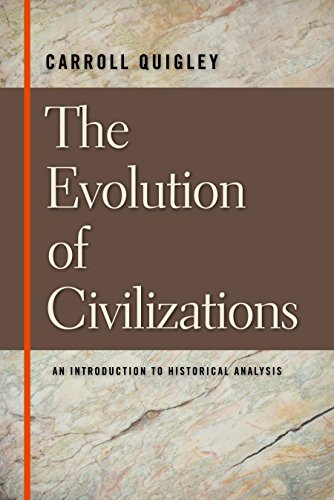
Sinopsis
Carroll Quigley was a legendary teacher at the Georgetown School of Foreign Service. His course on the history of civilization was extraordinary in its scope and in its impact on students.
Like the course, The Evolution of Civilizations is a comprehensive and perceptive look at the factors behind the rise and fall of civilizations. Quigley examines the application of scientific method to the social sciences, then establishes his historical hypotheses. He poses a division of culture into six levels from the abstract to the more concrete. He then tests those hypotheses by a detailed analysis of five major civilizations: the Mesopotamian, the Canaanite, the Minoan, the classical, and the Western.
Quigley defines a civilization as “a producing society with an instrument of expansion.” A civilization’s decline is not inevitable but occurs when its instrument of expansion is transformed into an institution—that is, when social arrangements that meet real social needs are transformed into social institutions serving their own purposes regardless of real social needs.
"Sinopsis" puede pertenecer a otra edición de este libro.
Críticas
The only book that improves on and develops Toynbee's work. . . . The very best work of its kind I have read in a very long time. --Crane Brinton, Harvard University
Reseña del editor
Carroll Quigley was a legendary teacher at the Georgetown School of Foreign Service. His course on the history of civilization was extraordinary in its scope and in its impact on students.
Like the course, The Evolution of Civilizations is a comprehensive and perceptive look at the factors behind the rise and fall of civilizations. Quigley examines the application of scientific method to the social sciences, then establishes his historical hypotheses. He poses a division of culture into six levels from the abstract to the more concrete. He then tests those hypotheses by a detailed analysis of five major civilizations: the Mesopotamian, the Canaanite, the Minoan, the classical, and the Western.
Quigley defines a civilization as “a producing society with an instrument of expansion.” A civilization’s decline is not inevitable but occurs when its instrument of expansion is transformed into an institution—that is, when social arrangements that meet real social needs are transformed into social institutions serving their own purposes regardless of real social needs.
"Sobre este título" puede pertenecer a otra edición de este libro.
Otras ediciones populares con el mismo título
Resultados de la búsqueda para Evolution of Civilizations: An Introduction to Historical...
EVOLUTION OF CIVILIZATIONS, THE [] QUIGLEY, CARROLL
Librería: College Campus, North Fort Myers, FL, Estados Unidos de America
Condición: Good. Used Item. Does not include New Access Codes , Cd's or one time use items that come when New. This item is Used. Nº de ref. del artículo: 091396657613122-CR02370678
Comprar usado
Se envía dentro de Estados Unidos de America
Cantidad disponible: 2 disponibles
EVOLUTION OF CIVILIZATIONS, THE
Librería: YESIBOOKSTORE, MIAMI, FL, Estados Unidos de America
hardcover. Condición: As New. Nº de ref. del artículo: 0913966568-VB
Comprar usado
Se envía dentro de Estados Unidos de America
Cantidad disponible: 1 disponibles
EVOLUTION OF CIVILIZATIONS, THE
Librería: ThriftBooks-Dallas, Dallas, TX, Estados Unidos de America
Hardcover. Condición: Fair. No Jacket. Readable copy. Pages may have considerable notes/highlighting. ~ ThriftBooks: Read More, Spend Less. Nº de ref. del artículo: G0913966568I5N00
Comprar usado
Se envía dentro de Estados Unidos de America
Cantidad disponible: 1 disponibles
EVOLUTION OF CIVILIZATIONS, THE
Librería: ThriftBooks-Atlanta, AUSTELL, GA, Estados Unidos de America
Hardcover. Condición: Good. No Jacket. Pages can have notes/highlighting. Spine may show signs of wear. ~ ThriftBooks: Read More, Spend Less. Nº de ref. del artículo: G0913966568I3N00
Comprar usado
Se envía dentro de Estados Unidos de America
Cantidad disponible: 1 disponibles
EVOLUTION OF CIVILIZATIONS, THE
Librería: ThriftBooks-Dallas, Dallas, TX, Estados Unidos de America
Hardcover. Condición: Fair. No Jacket. Missing dust jacket; Readable copy. Pages may have considerable notes/highlighting. ~ ThriftBooks: Read More, Spend Less. Nº de ref. del artículo: G0913966568I5N01
Comprar usado
Se envía dentro de Estados Unidos de America
Cantidad disponible: 1 disponibles
EVOLUTION OF CIVILIZATIONS, THE
Librería: ThriftBooks-Dallas, Dallas, TX, Estados Unidos de America
Hardcover. Condición: Good. No Jacket. Pages can have notes/highlighting. Spine may show signs of wear. ~ ThriftBooks: Read More, Spend Less. Nº de ref. del artículo: G0913966568I3N00
Comprar usado
Se envía dentro de Estados Unidos de America
Cantidad disponible: 1 disponibles
EVOLUTION OF CIVILIZATIONS, THE
Librería: ThriftBooks-Atlanta, AUSTELL, GA, Estados Unidos de America
Hardcover. Condición: Very Good. No Jacket. May have limited writing in cover pages. Pages are unmarked. ~ ThriftBooks: Read More, Spend Less. Nº de ref. del artículo: G0913966568I4N00
Comprar usado
Se envía dentro de Estados Unidos de America
Cantidad disponible: 1 disponibles
The Evolution of Civilizations
Librería: Revaluation Books, Exeter, Reino Unido
Hardcover. Condición: Brand New. 2revised ed edition. 444 pages. 9.25x6.00x1.75 inches. In Stock. Nº de ref. del artículo: 0913966568
Comprar nuevo
Se envía de Reino Unido a Estados Unidos de America
Cantidad disponible: 1 disponibles


